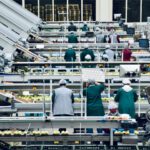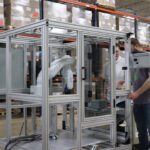What’s Brewing in Factory Automation?
Are craft beer and automation compatible? While the beverage industry long ago automated manufacturing and packaging operations, today’s craft breweries pride themselves on the personal touch. Is there a place for factory automation in small-batch brewing?
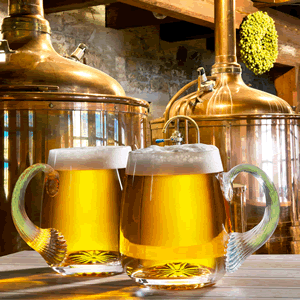 Over the past fifteen years or so, the American beer market has seen a rapid expansion of small breweries producing thousands of beers, often with the brewer’s particular “craft” and touch at the heart of the products’ expressed value. This is a major departure from what Prohibition left the American brewing industry with, and which dominated the American beer market in the late 20th Century – several very large breweries producing just a few brands.
Over the past fifteen years or so, the American beer market has seen a rapid expansion of small breweries producing thousands of beers, often with the brewer’s particular “craft” and touch at the heart of the products’ expressed value. This is a major departure from what Prohibition left the American brewing industry with, and which dominated the American beer market in the late 20th Century – several very large breweries producing just a few brands.
Efficiency and nationwide consistency at the scale of brewery operations like those of Anheuser-Busch and Coors has always demanded the adoption of the latest in automation technology and has allowed these companies to unify the taste of Bud Lite and Coors Banquet from Maine to California. However, while automation marks a philosophical antitheses to what many craft brewers set out to do, at least a small subset is finding that when the control, consistency, and efficiency of the large breweries can be made accessible at a small scale, automation technology has a potential to improve the craft by putting even more control in the hands of brewers.
Craft Scale, Coors Consistency
In 2014, Philly Beer Scene reported that craft breweries like Hershey, Pennsylvania-based Tröegs (producers of DreamWeaver Wheat and JavaHead Stout) are partnering with food and beverage automation providers like Germany’s BrauKon to realize better control over their finished product, an advantage traditionally reserved for the large breweries. Tröegs’ John Trogner told Philly Beer Scene, “With automation, it’s much easier to get close to the original – really, really close – each and every time.”
BrauKon, the provider of Tröegs’ automation system, specializes in automation for breweries and sources its sensor technology from Endress+Hauser, a major player in the world of industrial process automation and measurement. Endress+Hauser produces sensors that provide data for the entire brewing process, from raw material storage to pressure and temperature in the brewhouse and inventory and supply chain management.
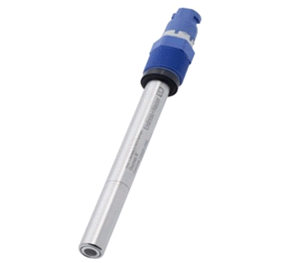
Components like Endress+Hauser’s Digital Oxygen Sensor offer fine control over the entire brewing process.
In addition to sensor equipment like flow meters and pressure sensors, the complex chemical operation of brewing with non-uniform natural ingredients requires sensors like Endress+Hauser’s Memosens amperometric oxygen sensor, which is used to monitor wort aeration, a critical factor in yeast condition monitoring. Effectively measuring and controlling dissolved oxygen in the wort (the soup of steeped malted barley that gets fermented to make beer) gives brewers control over the rate at which alcohol-producing yeast populates, helping to compensate for variations that might negatively affect a batch that is not tightly controlled. Like all components in food and beverage applications, the dissolved oxygen sensors and correlating data cables and equipment need to be waterproof and meet stricter standards for hygiene than in standard applications.
Automation for All
In spite of the special nature of this equipment, connector and sensor manufacturers make it clear that much of this technology is within reach of small and mid-sized breweries. According to Cory Jenkins of HARTING, “Connectorization in general helps and is accessible to all-size machinery companies. Any company that connectorizes in any market lowers their total cost of machine ownership and makes their equipment more mobile, interchangeable, and repairable. Connectorization is a trend that makes companies, including breweries, more competitive.”
Articulations like Jenkins’ of the tangible benefits of increasing automation are well thought-out and rational, but the message will continue to be lost on brewers that insist that craft and automation are mutually exclusive.
Part of the piecemeal uptake of brewery-specialized technology might also be simply due to some companies only recently focusing on the brewery niche and figuring out what features are demanded by breweries at different scales. While companies like Endress+Hauser have made significant inroads into the small brewery market with sensor and automation technology, others are just getting their feet wet and beginning to sound out what breweries are actually looking for.
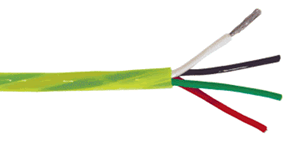
TPC Wire & Cable’s Defender cable has antimicrobial properties.
Annie Dorsey of TPC Wire & Cable said that while the company has been making heavy-duty cable equipment since 1978, it has only expanded into products for breweries in the last several years: “Since the brewery business is still relatively new for TPC, there are still quite a few unsold locations our team can connect with in hopes of identifying problem areas and bringing solutions – and so we don’t necessarily have the first-hand experience yet to be able to speak to the technological differences, in terms of automation, between what you’d find in a large-scale brewery versus a mid-size.”
Once again, this emerging understanding of what breweries actually want may indeed have more to do with small breweries in particular still negotiating the positives and negatives of automation. While the breweries are working out what they want from automation, companies like TPC are ready to bring decades of experience in other industries to brewing, and products like their antimicrobial Defender cable will be a boon wherever they are accepted.
The perspective of craft brewers on automation highlights the truth that pure rationality is not the only decision-making force in play when considering new technologies in certain industries. The pendulum for much of the industry may continue to swing from valuing craft to valuing industrial consistency, but the technology may well exist to join the two if small breweries are willing.
Neil Shurtz is a contributor to Connector+Cable Assembly Supplier based in San Francisco. As a freelancer and in his work in public relations for high-tech companies, he has written about technology in the oil and gas, aerospace, and manufacturing industries. Shurtz specializes in framing complex and niche technical topics in a broader social context.


